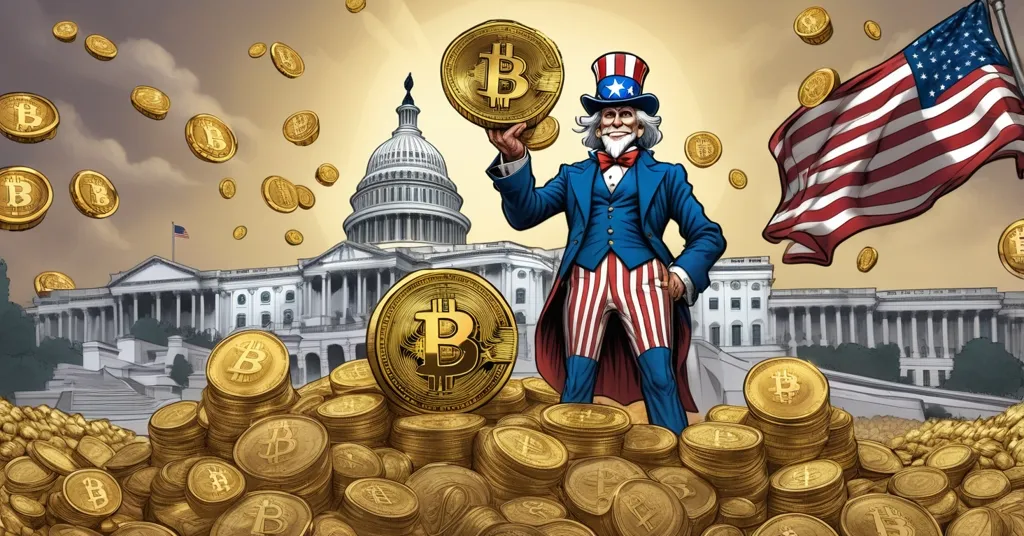Congressman Begich Proposes The Bitcoin Act: Aiming for 1M BTC Acquisition

Congressman Nick Begich Champions The Bitcoin Act to Acquire 1 Million BTC
Congressman Nick Begich is leading a groundbreaking initiative with The Bitcoin Act, aiming to secure 1 million BTC over the next five years. This legislation seeks to establish Bitcoin as a strategic asset for the United States, garnering significant bipartisan support.
- Congressman Nick Begich pushes The Bitcoin Act.
- Legislation targets 1 million BTC acquisition over five years.
- Receives bipartisan support in Congress.
Begich’s bold proposal has attracted attention across the political spectrum, with co-sponsors including Representatives Pat Harrigan, Troy Nehls, Michael Rulli, and Senator Cynthia Lummis. Their backing reflects a growing consensus in Congress on Bitcoin’s potential to enhance U.S. financial stability and innovation. As Begich stated, “Congress is more knowledgeable about Bitcoin than ever before and is growing appreciative of the precarious conditions of the national debt and deficit.”
The Bitcoin Act outlines a strategic, budget-neutral plan to purchase 200,000 BTC annually. This will be achieved through Federal Reserve remittances—profits the Fed sends to the U.S. Treasury—and gold certificate revaluations, which are adjustments to the value of gold held by the government. But it’s more than just accumulating digital assets; the bill also safeguards the right to self-custody, allowing individuals to control their own Bitcoin without government interference. This aligns with the core values of financial freedom cherished by many in the crypto community.
This legislative move follows a presidential executive order to establish a “Strategic Bitcoin Reserve,” indicating the administration’s commitment to integrating digital assets into the national financial strategy. Moreover, the Act includes a proof of reserves system, akin to those used by some Central American countries, where the government’s BTC address is publicly disclosed. This transparency ensures that the public can verify the government’s holdings, cutting through any potential smoke and mirrors.
While the cryptocurrency industry and the public have shown enthusiasm for The Bitcoin Act, it’s crucial to acknowledge Bitcoin’s volatility. Critics might argue that investing heavily in a digital currency is a gamble, but as Begich and others believe, it’s a calculated risk that could pay off in the long run. “America cannot afford to fall behind in this financial revolution,” Begich emphasized, highlighting the strategic importance of the Act.
Bitcoin maximalists may celebrate the U.S. government’s potential to stockpile BTC, yet we must recognize the broader crypto ecosystem. Altcoins and other blockchains like Ethereum play vital roles in this financial revolution, filling niches that Bitcoin might not serve. As champions of decentralization and disruption, we must appreciate the diverse landscape that constitutes the world of crypto.
The Bitcoin Act, if passed, could set a global precedent, positioning the U.S. as a leader in digital financial innovation. It’s a bold step towards embracing the future of money and finance, but with significant implications. As Begich noted, “Any strategic reserve asset needs to be held long enough to be strategic,” suggesting a long-term vision for Bitcoin’s role in national security.
However, the road ahead might be bumpy. Regulatory hurdles, public skepticism, and the inherent risks of cryptocurrencies could pose challenges. Yet, the potential rewards—a more secure and innovative financial future—might just be worth the journey. And let’s not forget, with approximately 1 in 4 Americans owning cryptocurrency, public engagement and education on Bitcoin’s strategic role will be crucial.
Key Takeaways and Questions
-
What is The Bitcoin Act?
The Bitcoin Act is a proposed U.S. legislation that mandates the acquisition of 1 million BTC over five years to establish Bitcoin as a strategic asset.
-
Who supports The Bitcoin Act?
The Act has received bipartisan support from several members of Congress, including Representatives Pat Harrigan, Troy Nehls, Michael Rulli, and Senator Cynthia Lummis.
-
How does The Bitcoin Act plan to acquire Bitcoin?
It proposes budget-neutral mechanisms, such as Federal Reserve remittances and gold certificate revaluations, to purchase 200,000 BTC annually over five years.
-
What are the implications of The Bitcoin Act for Bitcoin’s role in the U.S. financial strategy?
If passed, the Act would position Bitcoin as a key component of the national financial strategy, potentially enhancing financial security and setting a global precedent.
-
How does The Bitcoin Act address self-custody rights?
The Act includes provisions to protect Bitcoin self-custody rights, ensuring that individuals can own and transact with Bitcoin without government interference.
-
What is the proof of reserves system mentioned in the Act?
The proof of reserves system proposed in the Act is designed to enhance transparency, similar to systems used by some Central American countries, where the government’s BTC address is publicly disclosed.
“Congress is more knowledgeable about Bitcoin than ever before and is growing appreciative of the precarious conditions of the national debt and deficit.” – Congressman Nick Begich
“The bill has received interest in the industry and beyond from proponents of digital assets and other political leaders.”
“The United States’ proof of reserves system, as defined in the bill, would be comparable to the one the Central American country uses, whereby the government’s BTC address is published.” – Congressman Nick Begich



